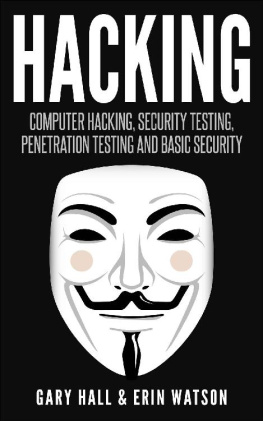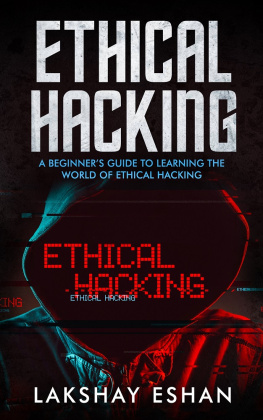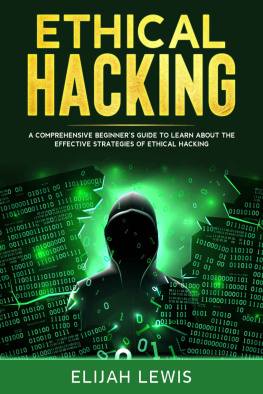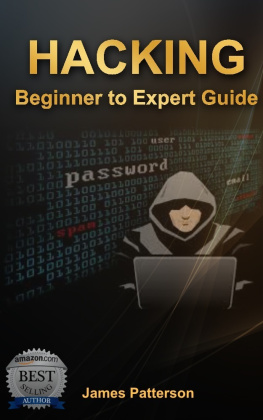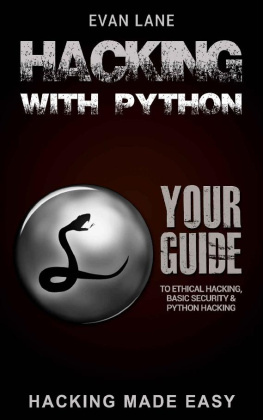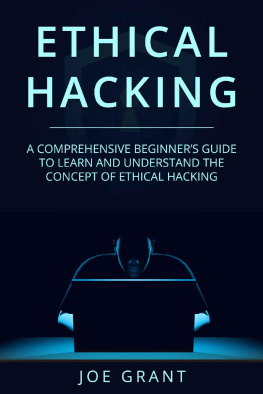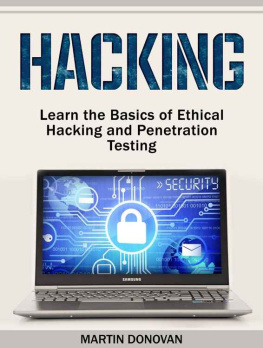HACKING
Computer Hacking, Security Testing, Penetration Testing And Basic Security
Gary Hall & Erin Watson
(c) Copyright 2016 - All rights reserved.
The contents of this book may not be reproduced, duplicated or transmitted without direct written permission from the author.
Under no circumstances will any legal responsibility or blame be held against the publisher for any reparation, damages, or monetary loss due to the information herein, either directly or indirectly.
ISBN - 978-1541289321
Legal Notice:
This book is copyright protected. This is only for personal use. You cannot amend, distribute, sell, use, quote or paraphrase any part or the content within this book without the consent of the author.
Disclaimer Notice:
Please note the information contained within this document is for educational and entertainment purposes only. Every attempt has been made to provide accurate, up to date and reliable complete information. No warranties of any kind are expressed or implied. Readers acknowledge that the author is not engaging in the rendering of legal, financial, medical or professional advice. The content of this book has been derived from various sources. Please consult a licensed professional before attempting any techniques outlined in this book.
By reading this document, the reader agrees that under no circumstances are is the author responsible for any losses, direct or indirect, which are incurred as a result of the use of information contained within this document, including, but not limited to, errors, omissions, or inaccuracies.
Introduction
Most people dont really understand what hacking is about, much less how to go about it. Its something that we just watch in movies or hear about on the news. This book, Hacking, Computer Hacking, Security Testing, Penetration Testing And Basic Security,
is meant to help you understand hacking techniques in a broader and deeper way.
Hacking is commonly viewed as an illegal activity that is designed to steal data or money. Though it is true that some hackers out there use their skill for criminal activities, this is not what hacking is really about. Hacking is simply a way of discovering ignored or unintended uses of a product or situation and then coming up with new ways of solving a problem.
In this book, you will learn how you can protect yourself from some of the most prevalent hacking schemes to date. How? By learning how to hack! Thats right. It would be inconceivable to expect to protect yourself and property from hackers without first understanding how hacking actually works.
If you want to stay ahead of hackers and perform your own counter-hack, you are in luck. You grabbed the right book. In here you will learn about the modern tools and advanced techniques that ethical and criminal hackers use. Not only will you learn how to search for weaknesses in a security system, you will also get to know how to identify a system that is under attack.
There are strategies that have been outlined here that will help you test the vulnerability of any system and prevent you from falling into black hat traps. This book is aimed at helping you improve information security for personal use as well as professionally. It is therefore very important that understand how electronic devices can be compromised without you even being aware of it.
The book uses simple language that beginners can understand. Experienced hackers who need to learn certain aspects of hacking in an in-depth manner can also use the book. This book provides great tips on how to become an ethical hacker for an organization that needs to fix any vulnerabilities in its systems.
The book is split into three parts, each discussing a different theme. Part I sets us off into the world of hacking, its history, and where we are now. Part II talks about the functional art of hacking various systems, networks, and applications. Finally, part III relates to what to do and what not to do regarding ethical hacking, and what the future holds for hacking. You can start with any part that interests you and maneuver as you see fit.
We hope that by the time you finish reading this book, you will have learned enough to better protect yourself and also perform some ethical hacking of your own.
PART I: INTO THE WORLD OF HACKING
Chapter 1: What is Hacking?
When the word hacking is mentioned, what kind of images come to mind? Do you think of criminals and vandals trying to steal data or spy on others? Do you think of someone sitting in front of an array of computers, sending out encrypted programs to people in order to gain unauthorized access to their computers remotely?
The truth is that the majority of people view hacking as an illegal activity. While it is true that criminal hackers do exist, they are actually just a small minority. Hacking is simply finding an alternative or unintended use of computer hardware or software, so as to enhance their applications and solve problems.
This is the technical definition of hacking. Hacking is using the technology available in new and counterintuitive ways in order to solve problems that conventional techniques cannot. It is only in our current digital age that hacking has become synonymous with bypassing security, illegally accessing another persons computer, and wrecking havoc.
The History of Hacking
Back in the late 1870s, Bell Telephone Company hired several teenage boys to work as switchboard operators. These boys decided to engage in some technological mischief by intentionally misdirecting and disconnecting phone calls, listening in on conversations, and other kinds of pranks. Though this was not called hacking back then, it was the earliest recognized incident of misusing technology. It is even believed that this was one of the reasons that the company decided to only hire female workers as operators.
Fast forward about 100 years later, in the 1950s. The word hack was used to refer to a shortcut or technique used to bypass the original operation of a system. The term was coined by MIT model train enthusiasts who received a donation of old telephone equipment, which they then used to create a complicated system for controlling their model trains. They were able to engineer a way to allow multiple operators to manipulate the track by dialing the telephone. These are considered to be the original hackers because they were able to take the equipment that they had and discover a new an inventive use for it.
A number of these model train hackers then became curious about the new computer systems that were being introduced on their campus. They were programming geeks that wanted to change the existing computer programs to make them better, customize them for special applications, and mostly just to have fun. The end result was that they produced modified and more elegant versions of the original programs. They werent just content to write programs that solved problems; they wanted their programs to solve problems in the best ways possible.
In the 1970s, there arose a different type of hacker whose focus was on exploiting the telephone system. These were referred to as phreakers, and their aim was to figure out how the electronic switching system worked so that they could make free long-distance phone calls. This is an example of one of the first anti-establishment movements that would later give birth to personal computer hackers.
As personal computers became more common in the 1980s, hackers were able to acquire their own devices and use the new technology to expand their reach. They quickly learned how to use modems to dial into and gain access to other peoples personal computers. It was at this time that Stephen Levy published Hackers: Heroes of the Computer Revolution, where he stated that there should be unlimited and total access to computers in order to understand how the world works. The desire to dissect, understand, and better appreciate computer programming in order to gain more knowledge would later be regarded as the Hacker Ethic.

